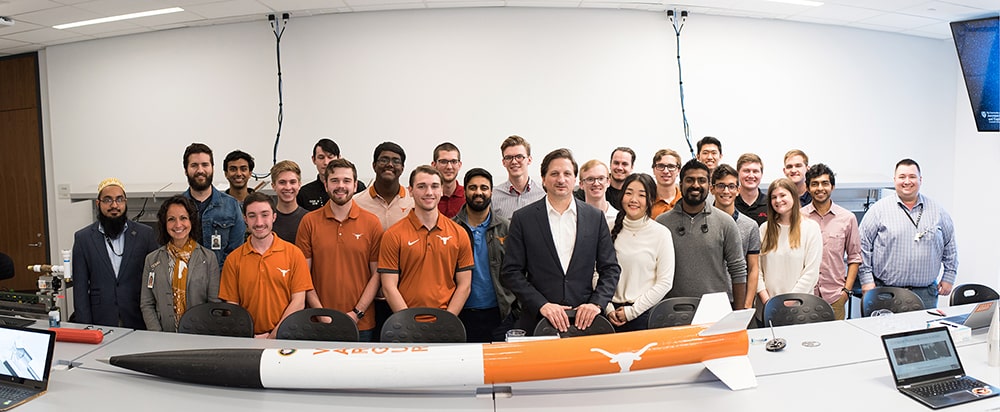
The University of Texas at Austin and Firefly Academy, a nonprofit organization run by Austin-based firm Firefly Aerospace, have partnered to establish Firefly@UT — a $1 million, multi-year program that, for the first time, will offer UT students the opportunity to design, develop and assemble an industrial-scale rocket capable of launching to the edge of space.
Philip Varghese, professor in the Department of Aerospace Engineering and Engineering Mechanics in the Cockrell School of Engineering, will serve as the faculty advisor for Firefly@UT. The program will be open to all UT students regardless of their field of study, giving hundreds of graduate and undergraduate engineers a rare opportunity to participate in the construction of a full-scale, liquid-fueled rocket. Through this new partnership, Firefly Academy will introduce students to hands-on rocket engineering and multidisciplinary collaboration earlier in their academic careers.
“We are very excited about this new partnership with Firefly Academy and think it will offer tremendous benefits to our Texas Engineering students,” said Sharon L. Wood, dean of the Cockrell School. “Not only is it important for outside organizations to work with students and have the ability to recruit them for future jobs, it is also important for schools to work with organizations to offer a more experiential, hands-on educational experience.”
At a program launch event on Tuesday, Dec. 4, the Cockrell School officially dedicated a 1,000-square-foot lab in its state-of-the-art Engineering Education and Research Center that will serve as the Firefly@UT headquarters. The newly named Texas Rocket Engineering Lab will enable students to work alongside aerospace engineering faculty members as well as receive mentorship on campus from Firefly Aerospace engineers — real-world industry-level experience that is typically reserved for off-site internships. Final construction of the rocket will take place at UT Austin’s J.J. Pickle Research Campus, where a 2,000-square-foot assembly lab will provide ample space to house the 30-foot-long structure.
The project will culminate with the 2021 Base 11 Space Challenge, a competition that tasks student-led teams with launching a liquid-propelled, single-stage rocket to an altitude of 100 kilometers by Dec. 30, 2021. Designed to encourage university rocketry programs and teach students about rocket safety and flight regulations, the competition boasts a $1 million prize that could be used to extend and enhance Firefly@UT in the years to come.
As the leader and facilitator of Firefly@UT, the Department of Aerospace Engineering and Engineering Mechanics is now one of only a few programs in the nation to offer a program like this.
“By making it possible for our students to build industrial-scale rockets and compete in the Base 11 Space Challenge, Firefly Academy is empowering them to truly engage in the practice of rocket engineering,” said Noel Clemens, chair of the Department of Aerospace Engineering and Engineering Mechanics. “Combined with our Longhorn Rocketry Association, which familiarizes students with industry-standard design processes and small-scale rockets, Firefly@UT will enable us to provide students with a broader understanding of rocket design and assembly. As a result, our graduates will leave the Forty Acres fully prepared to make an immediate impact in industry.”
Firefly@UT is inspired by a renewed international focus on encouraging more engineers, innovators and industry leaders to join the commercial space industry. By combining mentorship with hands-on experiences in a safe and educational environment, projects like this can help develop the confidence and skills necessary for the future jobs in this growing sector.
“Space is the future of our economy,” said Dr. Tom Markusic, founder and CEO of Firefly Aerospace. “With Firefly@UT, we want to help students develop a passion for rocket engineering and learn how to conceptualize designs and work with real materials. These are important skills and experiences that will set them apart in an increasingly competitive recruiting environment. By sharing the challenges we’ve overcome while developing our Firefly Alpha launch vehicle, we provide UT students a unique opportunity to learn as we learn and further the Firefly vision of ‘Making Space for Everyone.’”







